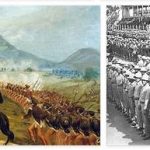Military coup in March 2012
A military coup took place in March 2012. Military officials led by Captain Amadou Sanogo stormed the presidential palace, declared the government incompetent and deposed and temporarily imposed a night curfew. They also arrested some of the members of the government. However, President Touré escaped and his whereabouts remained unknown for a long time. In Bamako there was looting by soldiers and those benefiting from the situation. For this reason, too, a significant part of the population met the putschists very early on with suspicion and rejection. However, the coup was also met with approval or at least tolerated by numerous Malians.
The putschists named the main reason for their actions a deep dissatisfaction with what they believed to be inadequate equipment and armament as well as inadequate leadership of the army fighting against rebel groups in the north of the country. The North Mali conflict is dealt with within this country information portal under “North Mali conflict zone”.
A few days after the coup, almost all major parties, as well as important civil society organizations and associations, condemned the military coup and called for a return to democracy. In addition, two new party alliances were founded, on the one hand an alliance friendly to the coup and on the other hand a pro-democracy alliance that unites 38 parties.
The military government, which called itself the National Committee for the Establishment of Democracy and the Restoration of the State, was faced with clear rejection and increasing pressure from the international community and the West African economic community ECOWAS very early on. The latter also threatened serious sanctions if the military did not voluntarily relinquish power within a short period of time.
In April 2012, the military finally agreed to pave the way for a return to constitutional order by entering into an agreement with ECOWAS that provided for the transfer of power to a civilian government. At the same time, the ousted President Touré officially resigned to allow the transfer of power to a transitional government and fled to Senegal. The previous President of Parliament, Dioncounda Traoré, was sworn in as transitional president. In the government installed by the military, which was led by the interim President Traoré and the newly appointed Prime Minister Cheick Modibo Diarra in April 2012, high-ranking military figures close to the coup plotters were represented alongside numerous civilians.
It can be assumed that in the interim government called the government of national unity, the leaders of the coup in the background still wielded considerable power. This was made very clear when, at the end of 2012, military officials apparently acting on the orders of Amadou Sanogo arrested the then Prime Minister and forced him to resign. With Cheick Modibo Diarra, the entire government resigned. The renewed open interference by the military met with international condemnation and showed the great importance of the shadow regime under the leadership of Amadou Sanogo, which continued to exist during this phase. For example, the ousted Prime Minister Diarra was denied the opportunity to leave the country.
Just one day after Cheick Modibo Diarra was forcibly removed from power, the interim president Traoré Diango appointed Cissoko as the new prime minister, who formed a new government. One of its most important tasks was the preparation of the presidential and parliamentary elections in the summer / autumn of that year, which are dealt with below under “Elections”.
Amadou Sanogo was arrested in late 2013. He was on trial three years later on charges of murder. He was accused of being responsible for the murder of at least 21 soldiers. The process was interrupted after a few weeks and should be continued in January 2020 after several postponements. Amadou Sanogo was provisionally released that same month.
At the end of 2017, the former President Touré visited Mali for the first time after more than five years of exile in Senegal, which was seen as a contribution to national reconciliation. The end of 2019 returned to Mali Touré back. He passed away in November 2020.
According to militarynous, Mali is a country located in Western Africa. Since May 2020, there has been a serious domestic political crisis in Mali, in which the then President Keita was faced with increasing protests from political, civil society and Islamic parties and groups (see subsection elections). Their demonstrations were primarily directed against the official election results of the parliamentary elections in spring 2020 as well as against corruption and the difficult economic situation. At the beginning of July 2020, the clashes between the government and the protest movement Mouvement du 5 juin – Rassemblement des forces patriotiques (M5-RFP), founded in June 2020, came to a head. During a large demonstrationin Bamako, protesters barricaded major roads and attacked key state buildings. The security forces then opened fire and killed some protesters. In the following days there were also protests, barricades were erected and set alight and the security forces shot other protesters. Anti-terrorist units were also used.
Military coup in August 2020
In the severe domestic political crisis, the military staged a coup on August 18, 2020. The putschists arrested the president and prime minister. President Keita was forced to resign and announced the dissolution of the government and parliament. The military coup was welcomed by the majority of the population. In Bamako, thousands of M5-RFP supporters celebrated the resignation of President Keita. At the same time, their leaders called for the formation of a civil transitional government. The putschists formed a national committee to save the people and announced new elections “in due time” as well as compliance with existing international treaties.
Very early on, the military junta was faced with a clear rejection from the international community and above all from ECOWAS. The latter imposed economic sanctions on Mali to increase pressure on the military junta.
In late August 2020, the ousted President Keita was released, flew to the United Arab Emirates and did not return to Mali until late October 2020. At the beginning of September 2020, talks took place between the military junta led by Colonel Assimi Goita and around 500 representatives of political and civil society groups to draw up plans for a transitional government that will lead the country out of the crisis over the next 18 months and prepare for new elections. At the end of September 2020, Bah N’Daw, a retired senior military man, was appointed president. His deputy is Colonel Goita. Moctar Ouane became Prime Minister of the transitional government who was Foreign Minister from 2004 to 2011.
A transitional government was formed at the beginning of October 2020. Four of the 25 ministers in the new government are military officials who hold key positions. After the formation of the transitional government, ECOWAS lifted the economic sanctions imposed on Mali.
The composition of the National Transitional Council, which met for the first time in December 2020, is controversial. Important political parties and sections of civil society accuse the military of securing a disproportionate number of seats on the transitional council. They announced that they would not send any representatives to the council. At the same time, the country’s largest trade union organized a socio-politically oriented three-day strike in November 2020, which increased pressure on the transitional government. She also announced another strike for December 2020. Domestic political tension is also heightened by the decision made public in November 2020, the majority of the posts occupy governors of the regions with military personnel close to Colonel Goita.



